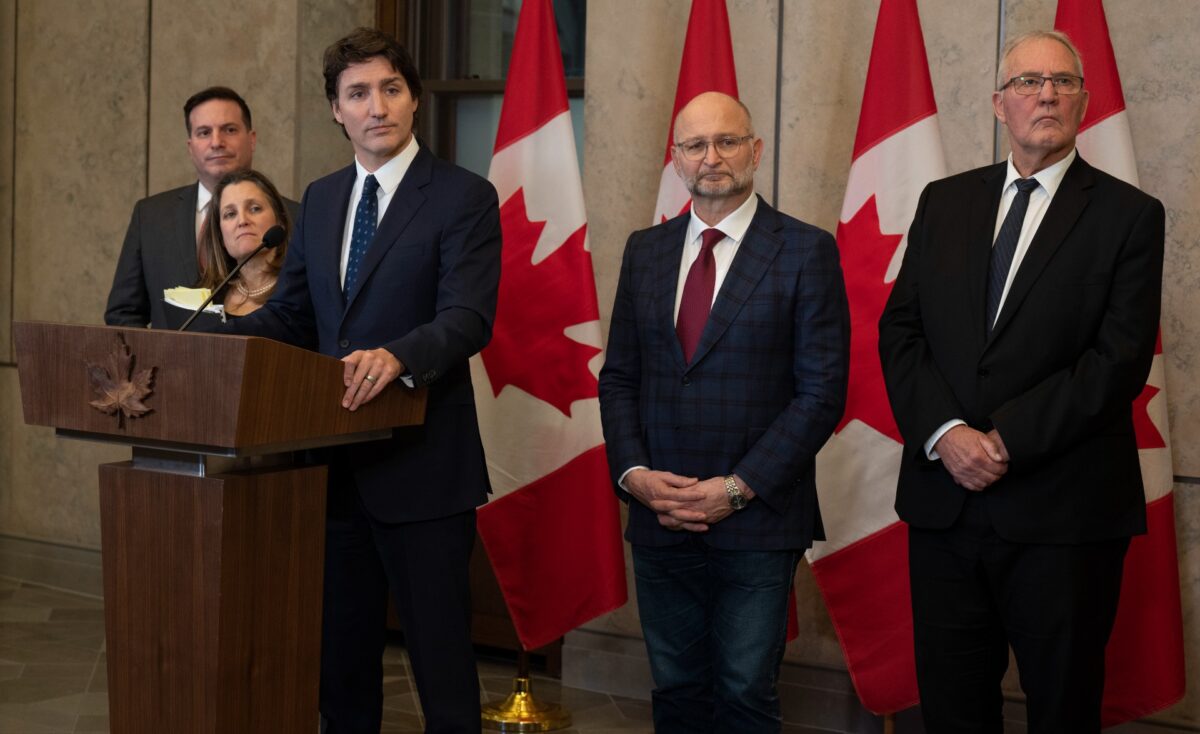


Prime Minister Justin Trudeau said on Feb. 17 that he regretted calling Freedom Convoy protesters a “small fringe minority.” His comments came as part of his response to the newly released Public Order Emergency Commission’s report.
While Commissioner Paul Rouleau said in his Feb. 17 report that the government was justified in invoking the Emergency’s Act last year to clear convoy protests against COVID-19 mandates, he said the government could have handled some things better. Trudeau’s way of talking about the protesters was one of them.
Rouleau wrote that calling them “a small fringe minority” and making other disparaging comments “served to energize the protesters, hardening their resolve and further embittering them toward government authorities.”
Trudeau said he has reflected on that over the past months, not just following the release of the commissioner’s report. “I wish I had phrased it differently.”
He said many of the protesters “were just hurting and worried and wanting to be heard.” He continued to criticise, however, “a very small number of people in this country who deliberately spread misinformation and disinformation that led to Canadians’ deaths.”
“I do not withdraw what I said about that small group,” he said. “But I do regret that my comments on that small group might have been depicted as an attack on protesters, generally people who wanted to exercise their freedom of speech.”
Trudeau said, “There are lessons for everyone involved—law enforcement agencies, all orders of government and elected officials.”
Rouleau said it shouldn’t have gotten to the point that the Emergencies Act needed to be invoked. He said that there were a series of policing failures throughout the events, and as well, there was a “failure of federalism.”
“We will continue to do everything we can to work collaboratively across orders of government,” Trudeau said. “I think there are reflections for other orders of government as well, as [to] what they can draw from this commissioners report. And I certainly recommend all of my fellow first ministers to read this report carefully.”
He said the provinces could have been better partners, and the federal government could also have worked better with the provinces.
Trudeau said the Emergencies Act was a “last resort.”
“It is unfortunate. It was undesirable. We didn’t want to do it. But we got to a place where there was no other choice to keep Canadians safe,” he said. Rouleau, he said, “has decided that last year we were indeed confronted with a national crisis, an emergency, and the very high threshold which should be respected to invoke the Emergency Act had been respected. Those measures should not be taken lightly.”
He knew, he said, that the commission would be making an inquiry—as is required by law when the Act is invoked—to ensure transparency for the public.
Rouleau set a timeline of six months for the government to respond to his recommendations, which include revising the Emergencies Act. Trudeau said he is committed to meeting that deadline.
Regarding the freezing of protester’s bank accounts, Deputy Prime Minister and Minister of Finance Chrystia Freeland said, “Our overriding objective, of course, was to end the illegal blockades and occupation, it was to do so without violence without anyone being hurt. And the economic measures were a tool that really helped make that happen.”
Rouleau said these measures were warranted overall, but criticised “the absence of any discretion related to freezing assets, and the failure to provide a clear way for individuals to have their assets unfrozen when they were no longer engaged in illegal conduct.”
Freeland said Rouleau recognized that “work was done urgently at the time and was being done between the government and law enforcement bodies and banks, to ensure that there was a process in place to unfreeze the accounts.”
She said, “In the very horrible event, that this ever has to happen again, for sure, there are some lessons for us.”
